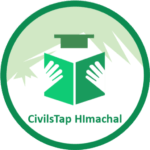
Himachal is known for its aesthetic beauty and spiritual strength. People in Himachal are laborious and honest. But being a hilly state there are certain inherent limitations which students of himachal face like inaccessibility to quality education, economical constraints and near absence of competitive ecosystem and awareness.Our team aspires to bridge this gulf with our youtube channel providing e-content in the form of videos and PDF etc irrespective of geographical barriers.